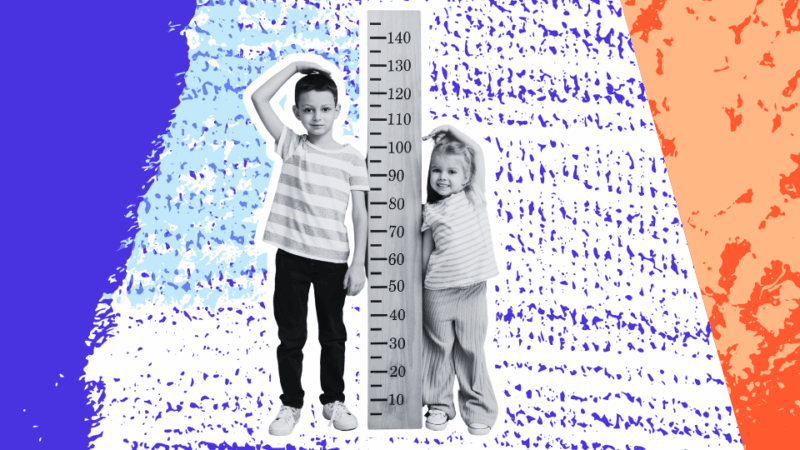What Is Weight Talk and Why Is It Harmful for Kids?
Published November 3, 2021 | Last Updated December 18, 2025

Comments about weight show up in everyday life more often than we realize. They slip into compliments, jokes, health conversations, and even the way adults talk about their own bodies. Most of the time, these comments are unintentional, shaped by the language many of us grew up hearing. For kids, though, these moments matter.
Children are constantly taking cues from the adults around them. They listen not only to what we say directly to them, but also to how we talk about ourselves and others. Over time, those messages shape how kids understand their bodies and their worth. That’s why understanding weight talk and learning how to shift it plays an important role in protecting kids’ physical and mental health.
What is Weight Talk?
Weight talk refers to any comment about weight, body size, or shape, regardless of intention. It can be directed at a child, another adult, or yourself.
It often includes:
- Comments about how someone’s body looks (both positive and negative)
- Praise or concern related to weight changes
- Observations about bodies in media, sports, or social settings
- Self-critical remarks about appearance
Even comments meant as compliments can send the message that bodies are something to be evaluated. Over time, this kind of language can normalize body judgment and comparison.

Why Weight Talk and Weight Stigma are Harmful for Kids
Kids are still developing their sense of identity. When weight becomes a regular topic of conversation, children can begin to connect body size with value, success, or acceptance.
Weight talk is closely connected to weight stigma — negative beliefs, stereotypes, and judgments about people based on body size. According to the National Eating Disorders Association, weight stigma can contribute to body dissatisfaction, low self-esteem, anxiety, depression, and disordered eating, while also creating barriers to care and support.
When kids hear weight-based judgments, whether directed at themselves, others, or spoken casually, they may internalize the idea that certain bodies are more worthy of respect than others. These messages don’t require teasing or bullying to take hold. Casual comments are often enough.
Over time, weight talk can shift kids’ attention away from how their bodies feel and function and toward how they look or compare to others, influencing confidence, eating behaviors, and overall well-being.
Weight is Not the Same as Health
Many adults talk about weight because they care deeply about children’s health. That concern is real. The challenge is that weight alone is not a reliable indicator of health.
Health is shaped by many factors beyond size, including genetics, access to food, sleep, stress, movement, relationships, and emotional well-being. When weight becomes the focus, kids may miss the broader picture of what helps them feel strong, capable, and supported. WithAll’s 7 Guiding Principles offer guidance for keeping health conversations centered on well-being rather than appearance.
“Someone casually threw out, ‘Wow, you look a lot bigger than you did in high school! Have you gained weight?’
The comment about my size and the shape of my body was what I would call an unintentional cruelty. In fact, when I look back on it, they may have even intended the remark as a compliment!
But whatever the intention was, that evening, I slid back into my eating disordered habits for the first time in over a year.”
– Jessie Diggins, Olympic Athlete and What to Say Ambassador, in her book “Brave Enough”
What to Say Instead of Weight Talk
Reducing weight talk does not mean avoiding conversations about bodies or health. It means choosing language that removes judgment and centers care.
Helpful shifts can include:
- Talking about strength, energy, or enjoyment rather than looks
- Highlighting abilities, interests, or effort
- Using neutral, respectful language when speaking about your own body
Here are a few ways those shifts can sound in everyday moments:
- When you notice movement or activity:
- “It seemed like you were having fun moving your body.”
- When you’re tempted to criticize your own body:
- “I’m grateful for what my body lets me do.”
- When bodies or appearance come up in conversation:
- “Everyone’s body is different, and that’s okay.”
- When you want to connect without commenting on appearance:
- “It’s really good to see you.”
These simple language shifts help kids learn that their bodies are not something to judge or fix. They create space for kids to focus on how their bodies feel, what they can do, and who they are.
Why Small Changes Matter
Changing the way we talk about weight takes practice. Most adults are unlearning messages they’ve heard for years, and no one gets it right all the time.
What matters most is the pattern kids experience. When weight talk decreases and supportive language increases, kids gain space to trust their bodies and themselves. Over time, these choices help create environments where kids feel safe, respected, and valued.
This approach is at the heart of WithAll’s What to Say program, which helps adults navigate everyday conversations about food, bodies, and health in ways that protect kids’ well-being. The goal is not perfect wording, but thoughtful, informed choices that support kids without shame or judgment.
If you want to go deeper and untangle your own beliefs about food, bodies, and health — not just for kids, but for yourself — What to Say For Me is an on-demand, self-paced course designed to help adults unpack diet culture, build a more compassionate relationship with their bodies, and feel confident passing those messages on to the kids in their lives.

